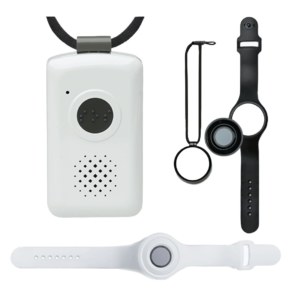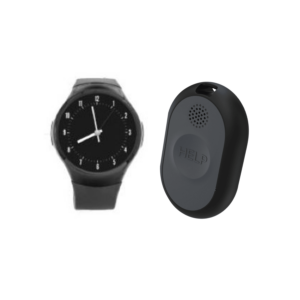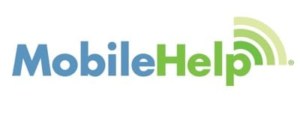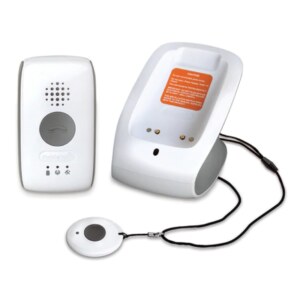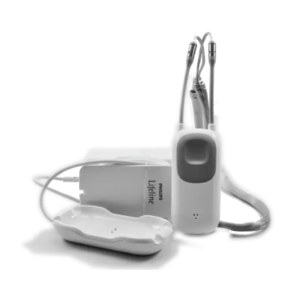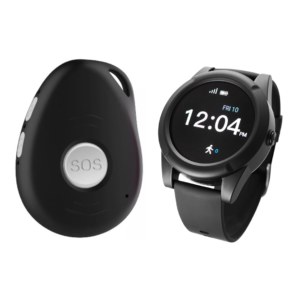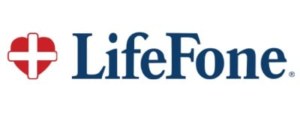7 Of The Best GPS Medical Alert Systems with Fall Detection
7 Of The Best GPS Medical Alert Systems with...
Key Takeaways
- A medical alert system with GPS is a good investment if you need emergency coverage when you’re away from home.
- Not all medical alert systems have GPS capabilities. On-the-go devices are the most common medical alert systems with GPS.
- Medical alert systems with GPS allow monitoring center operators and loved ones to identify the location of a person wearing the device.
- Monitored medical alert systems with GPS use cellular service to connect with a call center.
- You can wear the mobile GPS help button that comes with a medical alert device on your wrist, around your neck, on a belt buckle, or carried in a bag or purse.
What Is a Medical Alert System with GPS?
The National Institute on Aging recommends medical alert systems—also known as personal emergency response systems—for older adults who live alone, as they are at a higher risk for falls and fall-related injuries compared to younger adults.
Medical alert systems with GPS are mobile devices that connect to a monitoring center via cellular network or Wi-Fi. Devices with GPS tracking allow caregivers to always see your location and know if you’re safe. Your exact location is also shared with the monitoring center agent during an emergency.
Active older adults who live alone frequently invest in mobile medical alert devices with GPS technology because they provide easy access to help during an emergency, even if the wearer doesn’t know their exact location.
“Medical alert systems often restore older adults’ independence, which can have a positive effect on their health and wellbeing as well,” says Jenny Sanford, an Adult-Gerontology Primary Care Nurse Practitioner and Caregiving Coach in New York.
You can wear a medical alert device with GPS around your neck, on your wrist, on a belt buckle, or you can carry it in a bag or purse. During a medical emergency, you press the help button on the device. This initiates two-way communication with an operator at the company’s monitoring center, who will respond to your emergency by contacting friends, family, or 911, if necessary. Since it uses GPS and cellular technology, operators and responders can pinpoint your exact location even if you can’t relay that information.
What Are the Best Medical Alert Systems with GPS?
Medical Guardian offers on-the-go and at-home medical alert systems. The on-the-go systems are GPS-enabled and include:
- Mini Guardian: A small, wearable GPS tracking medical alert device with two-way communication and an easy-to-operate help button. It’s available in three colors: silver, black, and white. You can wear the Mini Guardian with a magnetic lanyard around your neck, as a belt clip, or clip it to clothing. It requires a $124.95 one-time equipment fee and a $39.95 monthly monitoring-center fee.
- Mobile Guardian 2.0: A wearable GPS tracking medical alert device that has cellular service. You can wear the Mobile 2.0 with a magnetic lanyard around your neck, as a belt clip, a wrist button, or clip it to clothing. You can add a wall-mounted help button for an additional charge. This is a good option for an older adult who wants coverage at home and on the go. The Mobile Guardian 2.0 requires a $124.95 one-time equipment fee and an ongoing $39.95 monthly monitoring center fee.
- Active Guardian: More active seniors looking for a medical alert system with GPS tracking should check out the Active Guardian, an all-in-one wearable device with a help button and two-way speaker. It offers the longest-lasting mobile coverage and is the most lightweight mobile device the company offers. The Active Guardian costs $44.95 per month and has no equipment fee.
Medical Guardian also has a Freedom Guardian GPS smartwatch with voice-to-text messaging, emergency help button, location-based weather forecasts, heart-rate monitoring, and more. This device is not yet available for shipping, but you can preorder the Freedom Guardian 2.0 on Medical Guardian’s website or over the phone.
Our pick for the best medical alert system with GPS is Bay Alarm Medical. This company offers four medical alert systems, including in-home, on-the-go, on-the-road, and an SOS Smartwatch device. GPS is not available with the in-home-only system. The on-the-go systems with GPS include:
GPS Help Button—Offers two-way communication with Bay Alarm’s call center through 4G LTE cellular network connections. Once called, the operator will contact friends, family, or local 911 services, if needed. This mobile GPS device is available in black or white. You can carry it in your hand pocket, purse, or bag. The help button requires a one-time fee of $79 plus $29.95 per month for monitoring services.
Automatic fall detection is available for an additional charge. This feature automatically contacts the emergency monitoring center if a falling motion is detected followed by no movement.
SOS Smartwatch—If you want an activity tracker and medical alert help button, the SOS Smartwatch is the way to go. Bay Alarm Medical is one of only a handful of reputable medical alert companies that offers a smartwatch option. The SOS smartwatch requires a one-time fee of $159 plus $29.95 per month for monitoring services. It does not include automatic fall detection.
Bundle Package— Includes an in-home base-station medical alert system and one on-the-go device (GPS button or SOS smartwatch). The bundle packages start at $39.95 per month for the monitoring center fees plus the one-time equipment fee for either device. This plan is ideal for seniors who want total coverage at home, outdoors, and on the go.
Another thing that sets Bay Alarm Medical apart from its competitors is its Split-second In-Car Alert, which gives you 24/7 in-car monitoring with automatic crash detection and location tracking. It plugs into your cigarette lighter. You can add this feature to any system for $29.95 per month. Bay Alarm is also a good choice if you need access to multilingual dispatchers.
Mobile GPS subscription plans include the Caregiver Tracking App, which allows loved ones to check a user’s current location in real time and track location history. This is an excellent feature for caregivers who live away from a loved one or want to keep tabs on them when they leave the house.
MobileHelp is a top-rated medical alert company that offers on-the-go and home systems with no hidden costs or equipment fees. Users looking for a GPS-enabled system can choose from the on-the-go and combo home systems, including:
- MobileHelp Solo: The Solo provides protection at home and away from home with a waterproof wearable help button. It comes with a GPS-enabled mobile unit that works in the house and on the go. This system does not have a base. You will connect with the monitoring center via AT&T’s cellular service. MobileHelp Solo costs $37.95 per month, plus $10 if you add automatic fall detection.
- MobileHelp Micro: The Micro is MobileHelp’s lightest and smallest wearable help button. It comes with a detachable lanyard and is ideal for seniors who want a small GPS-enabled device that goes anywhere. The button connects to the monitoring center via AT&T’s cellular network. MobileHelp Micro is $33.95 per month.
- MobileHelp Duo: The Duo is a GPS medical alert system that provides two-way communication and protection at home and on-the-go. This system comes with an in-home base unit, mobile unit with GPS tracking, and a wearable neck pendant or wrist help button. The button connects to the monitoring center via AT&T’s cellular network. MobileHelp Duo costs $41.95 per month plus $10 if you add automatic fall detection.
- MobileDuo: A two-for-the-price-of-one GPS medical alert system that provides two-way communication and protection at home and on the go for two people. You’ll get two help buttons and the home base station for $44.95 per month plus $10 if you add automatic fall detection.
All MobileHelp medical alert users can take advantage of the Connect app, which provides notification and tracking for family members and caregivers.
American Association of Retired Persons (AARP) members get a 15% discount on certain monthly fees with Philips Lifeline. The company has three systems: HomeSafe Standard, On the Go, and HomeSafe with AutoAlert. If you want a GPS medical alert system, you need to choose On the Go. This mobile device has replaced the GoSafe 2 model.
On the Go: This mobile medical alert system with GPS is a wearable neck pendant that features two-way voice communication and fall detection capabilities, making it a great choice for active older adults who want coverage at and away from home. Many companies charge an additional monthly fee for fall detection, but this protective feature is included in the overall price.
One unique feature of the On the Go is the audio beacon. When activated by Lifeline, this beacon emits a loud sound that helps emergency responders find you during a medical emergency. On the Go also comes with Philips Cares, which allows you to connect a circle of family and friends via the app to easily provide support and share information.
Philips Lifeline On the Go is not a budget-friendly medical alert device. It requires a $19.95 activation fee for self-installation or $99 for a technician installation, plus a one-time equipment fee of $99.95. After the initial costs, On the Go is $49.95 per month.
With LifeStation, you get a GPS-enabled medical alert system that includes a Find My Loved One app, allowing caregivers to locate a loved one anytime as long as the loved one is wearing the medical alert help button with GPS tracking. LifeStation’s GPS-enabled devices are part of their on-the-go plan and include the Sidekick and Sidekick Smart.
LifeStation Sidekick: The Sidekick is a small, lightweight wearable GPS medical alert device that uses the AT&T 4G LTE network to connect to LifeStation’s monitoring center. Monitoring fees start at $37.95 per month plus $5 for automatic fall detection.
LifeStation Sidekick Smart: This GPS-enabled smartwatch allows users to call for help, track steps, monitor heart rate, and more. Monitoring fees start at $43.95 per month plus $5 for automatic fall detection.
LifeStation’s caregiver tools make the device a standout, but it’s also worth mentioning the service provided by the operators at the call center. After a call is answered and the operator determines the response, the operator will stay on the line with you to provide comfort and reassurance until assistance arrives. Another unique feature of LifeStation is its partnership with Uber Health, which allows users to arrange transportation to and from medical appointments. Also, LifeStation’s devices work with Amazon Alexa to help caregivers check on family members while at home.
Like other medical alert companies, LifeFone has at-home and on-the-go plans. If you want a medical alert system with GPS, you’ll need to go with the on-the-go plan or choose the combined at-home and on-the-go plan.
The LifeFone mobile medical alert system features a small help button with Voice-In-Pendant (VIP) and GPS that you wear around your neck while at home or away. It has a two-way speakerphone you can talk into when calling for help. The VIP is one of the smallest and most lightweight wearable help buttons available on the market, making it ideal for individuals who want a discreet help button that still provides maximum protection.
When on the go, you’ll use LifeFone’s cellular service—either Verizon or AT&T 4G LTE cellular service—whichever is available in your area. LifeFone identifies your location to the call center or another emergency contact through GPS tracking. If you want automatic fall detection, you will need to upgrade to the VIPx system.
The monthly monitoring service fees for LifeFone medical alert systems with GPS are as follows:
- At-Home and On-the-Go Plan: $39.95 plus $10 per month for fall detection
- At-Home and On-The-Go Voice-In-Pendant (VIP) Plan: $43.95 (fall detection not available)
- At-Home and On-The-Go Voice-In-Pendant (VIPx) Plan: $45.95 plus $5 per month for fall detection
LifeFone offers a 30-day, money-back guarantee, plus a lifetime warranty.
The Lively Mobile Plus is an all-in-one medical alert device with enhanced GPS and two-way communication that you can wear around your neck or clip on your belt. It’s larger than other wearable devices, so it may not be a good choice if you’re looking for a discreet help button. Lively uses Verizon’s cellular service to connect to monitoring center operators.
Lively offers three “Health and Safety” monitoring packages: basic, preferred, and ultimate. If budget is not an issue, the preferred package is the way to go. It provides comprehensive coverage and fall detection.
Basic package: $24.99 per month for urgent response
Preferred package: $29.99 per month for urgent response, urgent care, and Lively Link
Ultimate package: $39.99 per month for urgent response, urgent care, Lively Link, and fall detection. The ultimate package is the only one that offers fall detection.
- Urgent response is the 24/7 monitoring center you call in case of an emergency.
- Urgent care gives you 24/7 telephone access to a doctor or nurse from the comfort of your home.
- Lively Links is an app that sends alerts to an identified caregiver or loved one if you call urgent response.
If you’re an AARP member, make sure to ask about the exclusive $60 yearly discount on select Lively Health and Safety packages.
How Do Medical Alert Systems with GPS work?
Medical alert systems with GPS come with a help button that connects to a monitoring center during a medical emergency. When activated, the help button initiates two-way communication with an operator at the monitoring center who will respond to your emergency by contacting friends, family, or 911, if necessary. Since it uses GPS and cellular technology, operators and responders can pinpoint your exact location.
Types of GPS Medical Alert Devices:
In general, GPS medical alert devices come in four styles: bracelet, pendant, cellphone, or smartwatch.
Bracelet or wrist button: GPS wrist buttons or bracelets look like a watch but only contain the help button that alerts the monitoring center or designated emergency contact. They typically come in black or white and are easy to adjust and operate.
Pendant or necklace—A wearable GPS neck pendant is attached to a lanyard and resembles a large necklace. It generally sits at mid-chest level. Most devices are a bit bulky, so this is not ideal for people looking for something discreet. However, if you like the pendant help button but don’t want to wear it around your neck, ask about clipping it to a belt buckle or carrying it in a purse or bag.
Cellphone—All monitored medical alert systems come with a wearable help button or smartwatch. That said, some companies offer a separate app or subscription-based service you can use on a cellphone that works like a medical alert system by alerting emergency services when activated. This might be a good option for the average adult who wants quick access to emergency help, but it is not ideal for older adults who need closer monitoring or don’t want to carry a phone at all times.
Smartwatch—GPS medical alert smartwatches are newer devices offered by select medical alert companies. They often come with a one-time fee, but you can keep and use the watch even after canceling the monthly monitoring service. Most GPS medical alert smartwatches look like a typical wristwatch. Unlike the average smartwatch, they have a help button on the face or side of the watch that you can activate during an emergency. Some models also come with other features like step tracking, heart-rate monitoring, text messaging, and two-way communication.
What Is the Difference Between GPS Medical Alert Systems and Mobile Systems?
Medical alert systems with GPS are considered mobile systems that work via cellular technology. GPS capabilities allow an operator at the monitoring center or an identified emergency contact to identify your exact location even if you can’t respond.
Most mobile medical alert systems use GPS, but standard mobile systems without tracking technology can’t share your location with loved ones or a monitoring center agent. This can be dangerous if you’re unresponsive or unsure where you are.
Do I Need a Medical Alert System with GPS?
Deciding if you need a medical alert system with GPS comes down to a few factors. First, you may not need a GPS-enabled device if you are housebound and have a medical alert system with a base unit. According to Denise Brown, a consultant for medical alert device company and professional caregiving coach, a medical alert system equipped with GPS capabilities is beneficial for users because of the freedom and independence that it provides. “Some aging seniors may still have their mobility and mental agility but elect to start using a medical alert device because they find themselves living alone after losing a spouse, or just as a precaution as they age,” Brown said. “A device with GPS allows you to move freely while also providing caregivers the peace of mind of being able to locate you when they’re not around.”
Medical alert systems with GPS may include fall detection technology, which is important when considering senior safety. This means you can go for walks, to the store, or on a drive knowing that a caregiver or call center can find your location should an accident or medical emergency occur. If you are still active, move around outdoors, and often leave your home, a medical alert with GPS is a good investment.
Where Can You Buy Medical Alert Systems with GPS?
You can buy medical alert systems with GPS online or over the phone. The majority of companies have websites with details about devices, plans, fees, warranties, return policies, and information on how to order. Most sites have ordering systems that allow you to complete the entire process online. With that said, some sites have limited information and require a phone call to a customer service representative for prices, plans, and ordering. If you’re not comfortable purchasing a device and plan online, all medical alert companies listed in this roundup have excellent customer service and sales departments. They will answer any questions and assist you with selecting and purchasing a medical alert device. If you need help narrowing your search, take some time to read through the best medical alert systems reviews online.
Are Medical Alert Systems with GPS Waterproof?
Medical alert systems with GPS are either water-resistant or waterproof. Most are resistant to water, which means they can withstand splashing and high levels of humidity and are generally safe to wear in the shower or while bathing. If a device says it is waterproof, then most likely, it can handle being submerged for a short period of time. In general, avoid swimming or submerging any device for long periods of time in the water. Be sure to check the instructions that come with the device to determine its ability to handle water. Here are the specifications for the medical alert devices listed in this article:
- Bay Alarm Medical: Water-resistant
- Medical Guardian: Water-resistant
- MobileHelp: Neck pendant, wrist button, and fall button are all waterproof, but not designed to be submerged for long periods of time.
- Philips Lifeline: Waterproof in up to 1 meter of water for 30 minutes.
- LifeStation: Water-resistant
- LifeFone: Water-resistant
- Lively Mobile Plus: Waterproof
What to Look for When Shopping for a Medical Alert System with GPS
If you’ve decided to move forward with a medical alert device, the next step is to research various brands, styles, and systems. Here are some features to consider when shopping for a medical alert system with GPS.
Fall Detection
With automatic fall detection, you can wear a neck pendant or wrist button that automatically detects a fall based on your motion. If you fall, it contacts the emergency response center for you even if you can’t press the button. This feature is useful for all seniors, but it’s vital for older adults who have a history of falling or are at a higher risk of falling due to a medical condition or recent surgery. More than one out of four older adults fall each year, according to the Centers for Disease Control and Prevention (CDC).
With that in mind, it’s easy to see how falls are a good example of the value of monitored systems. “Falls are the number-one reason [the] independent elderly lose their independence and often lead to mortality…rapid response is key to protecting seniors,” said Dr. James Dan, MD, a geriatric clinical advisor and member of the Senior Helpers board of directors. Automatic fall detection detects falls with integrated sensors that directly connect to the call center, allowing emergency responders to immediately bring help. Additionally, the call center can contact family or friends.
Response Time
The average response time for most call centers is up to 60 seconds. When shopping for a medical alert system with GPS, make sure to ask about the average response time, which includes the amount of time it takes for the monitoring center to respond once you activate the help button. It’s also a good idea to read reviews online that discuss response time.
Voice Activation
Voice activation is an extremely helpful feature when it comes to GPS medical alert systems. Having a medical alert that has two-way voice capability and connects to a live, dedicated agent can quicken response times and help you remain calm during an emergency. Having a kind, reassuring person to talk to is invaluable in these critical moments.
Battery Life
Battery life is a key feature when choosing a device. The battery life of mobile medical alert systems with GPS are often shorter than home-based systems. It’s not uncommon to have to charge the device every three to five days, with some even needing daily charging. If needing to charge a device daily is a problem, you should opt for a system that lasts at least two to three days on one charge.
Style
Medical alert devices come in a variety of styles, including neck pendants, wrist buttons, smartwatches, and even devices you can hold in your hand, clip to a belt buckle, or toss in a bag. Many medical alert systems come with a neck and wrist help button, giving you the flexibility to choose the style that’s right for you, while others, like a smartwatch, are only available in a wrist style. You should be able to check the specifications for each device on the website. These include dimensions and weight.
Warranty
Before deciding on a medical alert system, ask about warranties and read the fine print. Some companies offer a limited warranty that only covers short-term wear-and-tear, while others guarantee the product for life. Additionally, companies like Bay Alarm Medical offer a protection plan that covers replacement of lost or damaged items for an added fee.
Pros and Cons of Medical Alert Systems with GPS
Pros
-
Most GPS devices are small, portable, and easy to carry in a purse or bag, or wear around your neck or on a belt buckle.
-
Connects with a monitoring center while you’re at home or on the go, providing full coverage any time you’re wearing the device.
-
Provides accurate information about location when you’re wearing the device. Because it is satellite-based, a call center operator, caregiver, or loved one can detect your location even if you’re lost, disoriented, or unable to communicate.
-
Can be a helpful tool for family members caring for someone with dementia or Alzheimer’s.
-
Several GPS medical alert devices are now available as a smartwatch that include notifications, fitness tracking, two-way communication, and texting.
-
Connects with caregiver apps allowing loved ones to monitor and track your location at any time.
-
Many products connect to caregiver apps, allowing loved ones to monitor and track your location at any time.
-
Helpful for seniors who are still driving and need GPS services.
Cons
-
Not all mobile GPS-enabled devices are available as Bluetooth medical alert systems with fall detection.
-
Often more expensive than at-home systems.
-
Some medical alert companies have a one-time fee for the GPS-enabled device.
-
Devices may need frequent charging.
-
Certain add-ons aren’t always available.
-
Coverage may be spotty if cellular services are not available in your area.
Why You Can Trust Our Expert Review
We strive to create honest, helpful reviews backed by firsthand shopping, testing, and research. Our content is medically reviewed and unbiased to help you choose the right medical alert system for you or your loved one.
From over 1,000 hours of research, we choose 11 of the top brands that we believe are the best medical alert systems. We did the following throughout our research process:
- Consulted with geriatricians and adult caregivers
- Mystery-shopped the brands
- Surveyed medical alert system users
- Tested various medical alert systems
- Interviewed experts in the field
- Read hundreds of verified customer reviews from trusted third parties, such as Better Business Bureau (BBB) and Trustpilot
Bottom Line
Adding a medical alert system with GPS to your life is a major step in improving personal safety while at home and on the go. In our research, seven companies stood out as solid choices for medical alert systems with GPS. Our top pick, Bay Alarm Medical, consistently meets high standards and receives top reviews from customers. It has a smartwatch and a traditional help button. Plus, the company has cutting-edge emergency technology you can use while driving—a feature we think is worth the extra $20 per month.
But if you want a medical alert that also doubles as a fitness tracker, then consider the Medical Guardian Active Guardian. This sleek smartwatch is an excellent pick for active older adults who want coverage both at home and away from home. Another high-quality smartwatch to consider is LifeStation’s SideKick Smart. This GPS-enabled smartwatch allows users to call for help, track steps, monitor heart rate, and more.
And, finally, couples looking for a budget-friendly system should consider MobileHelp’s MobileDuo. This “two-for-the-price-of-one” GPS medical alert system provides two-way communication and protection at home and on the go for two people. Our other top picks include Philips LifeLine, which offers a 15 percent discount for AARP members on certain monthly fees; LifeFone, which has the best variety of plans; and Lively Plus, which is a great option for seniors looking for a basic device.
Frequently Asked Questions
-
Global Positioning System, or “GPS” provides positioning, navigation, and timing data, according to GPS.gov. When used with a GPS-enabled medical alert device, the device receives signals from GPS satellites that transmit information to calculate your location. This allows call centers or loved ones to accurately determine your location when you activate the help button. GPS technology also provides a history of where you’ve been while wearing the medical alert device, which is helpful for people using unmonitored medical alert systems.
WRITTEN BY
Sara Lindberg is a freelance writer specializing in health, fitness, senior care and nutrition. With a master’s in education and bachelor’s in exercise science, she has worked as a personal trainer and group exercise specialist for older adults. Her work has appeared in several national print and media publications. In her own life, caring for a parent with health issues has allowed her to see firsthand how critical it is for seniors and their families to have accurate, compassionate, and relatable information as they make decisions about aging in place.
MEDICALLY REVIEWED BY
Jenny is an Adult-Gerontology Primary Care Nurse Practitioner in NYC with a passion for working with aging adults and their family members. Prior to her clinical training at Vanderbilt School of Nursing, she worked in business and medical research at Harvard Business School and Massachusetts General Hospital. As a Caregiving Coach at Givers, Jenny helps family members manage the financial, emotional, and educational stresses of caring for their loved ones who are aging in place.

